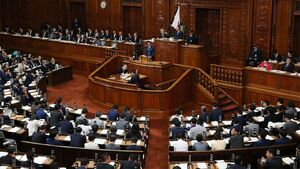| Impeachment of Ichirō Ozawa | |
|---|---|
 The National Assembly debates the articles of impeachment | |
| Accused | Ichirō Ozawa, President of Japan |
| Proponents | Seishirō Etō, Speaker of the National Assembly Masatoshi Ishida, Chairman of the Assembly Judicial Affairs Committee |
| Date | 5 April – 8 June 2010 |
| Outcome | Resolution containing two articles of impeachment adopted 28 May 2010; resolution became moot 8 June 2010 when President Ozawa resigned from office |
| Charges | Perjury, obstruction of justice |
| Cause | 2010 Japanese political scandal |
| Voting in the National Assembly | |
| Perjury | |
| Votes in favor | 290 |
| Votes against | 187 |
| Present | 1 |
| Not voting | 2 |
| Result | Approved |
| Obstruction of justice | |
| Votes in favor | 291 |
| Votes against | 186 |
| Present | 1 |
| Not voting | 2 |
| Result | Approved |
The impeachment of Ichirō Ozawa (Japanese: 小沢一郎の弾劾, Ozawa Ichirō no dangai) began in the National Assembly of the Republic of Japan on 5 April 2010 as a result of the 2010 Japanese political scandal. Organised by the newly elected Liberal Democratic Assembly majority, impeachment proceedings were initiated against Ichirō Ozawa, the 13th President of Japan, for "high crimes and misdemeanours". The specific charges against Ozawa were perjury and obstruction of justice.
In 2009, President Ozawa became implicated in the falsification of political funding reports of ¥400 million in campaign donations to his presidential campaign in 2008. The Tokyo Metropolitan Police initiated an investigation, and as a result of reports in the media of this development, the scandal exploded in notoriety. The Liberal Democratic opposition, including Ozawa's 2008 opponent, Tarō Asō, attacked the President and began lobbying for impeachment. Over the ensuing year, Ozawa's approval ratings collapsed; by January 2010, when two of Ozawa's aides had been arrested in connection to the scandal, one poll found 70% public support for impeachment. In the 2010 congressional elections, there was a massive swing against the Democrats, who lost 251 of their 308 seats in the National Assembly, and 27 of their 106 Senate seats.
During the election campaign, the Liberal Democrats, led by Assembly caucus leader Seishirō Etō, promised to begin impeachment proceedings should they win a majority in the next Congress. Now with a mandate, the Liberal Democrats delivered on their promise the day after the opening of the 33rd Congress, when Masatoshi Ishida, Chairman of the Judicial Affairs Committee, announced that the Committee would begin investigating the President. The Committee agreed to bring two articles of impeachment to a full vote of the Assembly on 10 May. The following day, Liberal Democratic floor leader Nobuteru Ishihara introduced the articles for consideration by the Assembly. After more than two weeks of debate, the final votes proceeded largely along party lines, with some Assemblymen from both major parties abstaining. Nevertheless, both articles were approved by the Assembly on 28 May 2010. With conviction and removal from office by a hostile Senate becoming increasingly likely, President Ozawa resigned from his office on 8 June 2010. Ozawa's Vice President, Yukio Hatoyama, resigned as well on the same day. Although arrangements for a Senate trial were being made at the time, further formal action was rendered unnecessary by his resignation, so the Assembly brought the impeachment process against him to an official close two weeks later.
Ozawa was the first President of Japan to have been impeached; no other has been subject to impeachment proceedings before or since. After a formal indictment in 2011, Ozawa was eventually acquitted in April. The Democratic Party never recovered from its disastrous fall from power in 2010, and after a series of mergers and splits its members are now divided between the Constitutional Democratic Party, the Democratic Party for the People, and Kibō no Tō.
| ||||||||||||||
